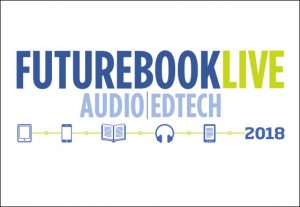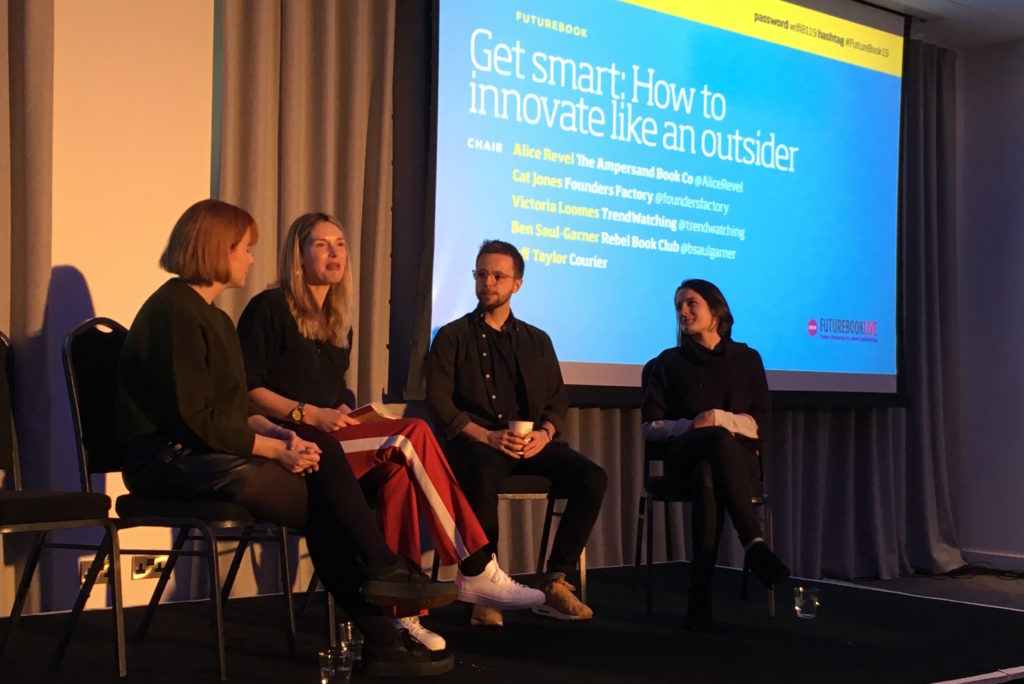Provoke, Predict and Play: The Bookseller FutureBook Conference 2018

Abbie Headon is Commissioning Editor at Prelude Books, and also writes and edits books as Abbie Headon Publishing Services. She is a 2018 Bookseller Rising Star and sits on the BookMachine Editorial Board.
Speaking in 1966, John F. Kennedy referred to an apocryphal ancient Chinese curse: ‘May you live in interesting times.’ And there’s no doubt that publishers are living through interesting times at the moment. We’ve seen the arrival of the ebook, the birth – and death – of a whole lot of tech start-ups, and the renaissance of the audiobook. Everything has changed, and yet, despite all the exciting disruption our industry has experienced, much of what we do would be recognisable to our ten-years-ago selves.
In her introduction to this year’s FutureBook Live programme, conference organiser Molly Flatt highlights this paradox: instead of focusing on the ‘big splashy projects of yore’, real innovation in our daily lives is ‘more likely to require a small, smart hack.’ And the conference sessions on 30 November embodied this grass-roots, real-world attitude, with more emphasis on small changes than tectonic shifts.
From the past to the future
In a keynote speech, David Shelley of Hachette looked back to his first days in publishing in 1997, to see how far we’ve come, and how far we still need to go. Back in that end-of-a-century era, long boozy lunches were still the norm, and staff were often valued more for being ‘clubbable’ than for being hard-working. Thankfully, things have moved on, and today it’s less remarkable to be a non-drinker, but Shelley commented that as an industry we still have a long way to go in terms of diversity and inclusion, and we should be further on now than we are.
In her keynote, futurist Tracey Follows wrenched us into the technological future that’s already on our doorsteps, highlighting key trends in discovery, virtuality and identity. Amazon is using predictive technology in its Amazon Go stores to discover what we’re going to buy next: their cameras track shoppers’ expressions, gestures and even their skin temperature to measure emotional engagement throughout the shopping experience. Follows predicted that virtual interfaces are also going to play an ever-larger role in our lives, blurring our sense of exactly how real the voices in our machines are: for example, an Alexa app called Mylestone creates stories from uploaded memories, making the past come to life, and next year a hologram of Amy Winehouse will go on tour, in a project which is eerie or innovative, depending on your point of view.
Seth Godin’s keynote, delivered by video, started by pointing out the unique burden of the bookselling trade: that retailers are expected to hold a copy of all available books, for all customers, at all times. In the online retail era, it’s impossible for any bricks-and-mortar store to compete on the basis of range or price, so Godin argued that what shops need to do is speak to a specific audience – just as fashion retailers do – and then serve that audience and ignore everyone else. When people go into a bookstore, they’re not there to buy a book: what they need is the way it feels to buy the book. ‘We don’t have a supply challenge. We have a meaning challenge.’
Working smarter, not harder
In his Build Better Ebooks session, Nick Barreto of Canelo demonstrated how technology can make our lives simpler by giving an insight into their production workflow. While traditionally, publishers have focused on the print book first and generated an ebook edition as an afterthought, Canelo runs on an ebook-first model. In this model, the manuscript of a book is prepared for publication using semantic markup rather than display markup; so for example, a phrase will be given an tag to show is has emphasis, rather than an tag to indicate italics. This is valuable because the concept of emphasis can be understood in all sorts of contexts, from a text-to-speech device for the visually impaired to a Google robot assessing the meaning of a text, while the concept of italics is limited essentially to the visual appearance of the text.
Using clean, uncluttered semantic tags also enables the Canelo team to create their own typeset files at the touch of a button, removing time and expense from their processes, thanks to open-source software called Pandoc. Barreto showed Pandoc in action, outputting print-ready PDFs in a matter of moments (though QA is needed – proofreaders still have a job), and he recommends that anyone with an interest in automating their processes in a smarter way should get to know this software.
This session was followed by a reprise of the Test Your Ideas with ThinkSprint workshop, which I covered in last year’s report. Sam Reid of ThinkSprint and Nick Coveney of Rakuten Kobo advocated moving away from our often rather inflexible project timelines to a faster process of developing, testing and improving products in a more active way. Reid highlighted Amazon as a company that is relentless in its pursuit of optimising everything, and shared his mantra that ‘Good now is better than perfect tomorrow.’ A great example of this from the publishing world, as Coveney pointed out, was The Pointless Book published by Blink: Alfie Deyes became the first YouTuber to hit the shelves and Blink reaped the rewards of their speed to market.
What readers really want
The siren call of a post-lunch nap was kept at bay by a spirited debate, chaired by Miriam Robinson, on the best ways to choose what your audience actually wants to read. Syima Aslam, the founder and director of the Bradford Literary Festival, explained how her programming decisions for the festival sprang from research into the demographics of the city; they decided to balance the programme’s content between events focusing on new titles and sessions covering issues relevant to the audience. The success of this approach is evident from the growth of BAME audience members to 51% of the total audience, with many coming from London and beyond, because they’re so interested in the topics under discussion.
Ali Albazaz of Inkitt represented the ultimate in data-driven decision-making. At Inkitt, all commissioning decisions are made by their 4m-strong audience, with some 2000 readers deciding on every book. By contrast, Lindsey Mooney and Keshini Naidoo of new publishing house Hera Books made a strong case for passion and gut feeling: they are guided by their years of expertise and knowledge of readership demographics, but they will only commission titles they are truly committed to on a personal level, books that keep them up all night reading to the final page.
The final keynote of the day also zeroed in on this question of how to find your audience and work out what they want to hear. Performance poet Sophia Thakur, introduced by OWNIT!’s Crystal Mahey-Morgan, explained how she works to create poetry that focuses on what subjects people care about, where they express themselves, and whose opinions they value. Using Instagram and YouTube as key outlets for her work, she communicates directly with her audience and builds poetry with them, from their experiences. Speaking of her work, Thakur said: ‘The blessing of this book is that it’s not about me… This is your book.’
Looking forward but keeping it real
All in all, this year’s FutureBook conference felt deeply grounded in the real lived experience of publishers and readers: there was much here that we could use in our everyday lives, and for me that was a real strength of the day. There was much more in the programme that I couldn’t cover, due to my inability to be in four rooms at once, so I recommend a good trawl of the #FutureBook18 hashtag for some serendipitous discoveries. One thing is certain: when it comes to the role of technology in our lives, things are only going to get more interesting for publishers from now on.





